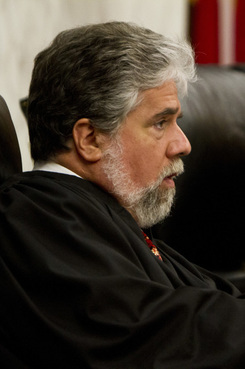Ga. Court of Appeals Throws Out $30M Hand Verdict
“It is the duty of the trial court, whether requested or not, to give the juryappropriate instructions on every substantial and vital issue presented by theevidence, and on every theory of the case,” Judge Christopher McFadden said.
March 16, 2018 at 01:00 PM
3 minute read

The Georgia Court of Appeals has tossed a $30 million verdict for an injured hand.
“Because the trial court erred in failing to instruct the jury on a substantial and vital issue presented by the pleadings and the evidence—the defendant's theory that his alleged negligence per se was unknowing and unintentional—we must reverse and remand for a new trial,” Presiding Judge Christopher McFadden wrote for a panel that included Judges Elizabeth Branch and Charlie Bethel.
“It is the duty of the trial court, whether requested or not, to give the jury appropriate instructions on every substantial and vital issue presented by the evidence, and on every theory of the case,” McFadden said. “Once a plaintiff establishes a prima facie case of negligence per se, the 'burden then shifts to the defendant to show that the violation was unintentional and in the exercise of ordinary care.'”
What became known as the $30 million hand verdict was delivered for injuries to a woman's hand and arm during a trial before Fulton County State Court Judge Eric Richardson in 2016.
The injury was caused by a crash that happened in 2012 when Abdulmohsen Almassud and Luisa Mezquital approached each other driving in opposite directions on a road in Forsyth County. Almassud's Jeep crossed the center line and crashed into Mezquital's car. Mezquital sustained severe injuries to her hand in the collision. When she sued, she alleged that the Jeep was unsafe. He claimed the steering failed and blamed Oh's Auto Center for a faulty repair, McFadden noted.
In oral arguments, Laurie Webb Daniel, chair of Holland & Knight's national appellate team and leader of the firm's Atlanta litigation practice, told the court she wouldn't belabor the sheer amount of the verdict—although she did mention it was “many, many times” in excess of judgments in comparable cases. Instead she focused on Richardson's instructions to the jury.
The judge, Daniel said, declined to include in the jury charge the sole defense raised by her client: that he lost control of his Jeep because of a mechanical defect in the steering. He had recently modified the Jeep for off-road use.
“We are pleased, of course, to get such a well-reasoned and unanimous decision in favor of our client, Mr. Almassud,” Daniel said Thursday.
Ben Brodhead of Brodhead Law won the $30 million verdict for Mezquital and defended it at oral arguments.
“Obviously, in a case of this importance, we expect further appeals,” Brodhead said Thursday in an email. “The ruling will likely have a far-reaching effect. Now, when a defendant presents even slight evidence that his violation of a statute was unintentional and in the exercise of ordinary care, the trial court must be reversed for failing to create a jury charge on this topic. This is true even when the defendant fails to ask for such a charge. Since there is no Pattern Charge, the trial courts have not been instructing the juries as required by the Court of Appeals. The ruling will likely cause a rush to the appellate courts to reverse every plaintiff's verdict involving negligence per se. Making this jury charge mandatory will impact almost all car wreck cases as well as all cases involving negligence per se.”
The case is Almassud v. Mezquital, No. A17A2119.
This content has been archived. It is available through our partners, LexisNexis® and Bloomberg Law.
To view this content, please continue to their sites.
Not a Lexis Subscriber?
Subscribe Now
Not a Bloomberg Law Subscriber?
Subscribe Now
NOT FOR REPRINT
© 2025 ALM Global, LLC, All Rights Reserved. Request academic re-use from www.copyright.com. All other uses, submit a request to [email protected]. For more information visit Asset & Logo Licensing.
You Might Like
View All
On The Move: Squire Patton Boggs, Akerman Among Four Firms Adding Atlanta Partners
7 minute read

Justice 'Weaponization Working Group' Will Examine Officials Who Investigated Trump, US AG Bondi Says

Trending Stories
- 1States Accuse Trump of Thwarting Court's Funding Restoration Order
- 2Microsoft Becomes Latest Tech Company to Face Claims of Stealing Marketing Commissions From Influencers
- 3Coral Gables Attorney Busted for Stalking Lawyer
- 4Trump's DOJ Delays Releasing Jan. 6 FBI Agents List Under Consent Order
- 5Securities Report Says That 2024 Settlements Passed a Total of $5.2B
Who Got The Work
J. Brugh Lower of Gibbons has entered an appearance for industrial equipment supplier Devco Corporation in a pending trademark infringement lawsuit. The suit, accusing the defendant of selling knock-off Graco products, was filed Dec. 18 in New Jersey District Court by Rivkin Radler on behalf of Graco Inc. and Graco Minnesota. The case, assigned to U.S. District Judge Zahid N. Quraishi, is 3:24-cv-11294, Graco Inc. et al v. Devco Corporation.
Who Got The Work
Rebecca Maller-Stein and Kent A. Yalowitz of Arnold & Porter Kaye Scholer have entered their appearances for Hanaco Venture Capital and its executives, Lior Prosor and David Frankel, in a pending securities lawsuit. The action, filed on Dec. 24 in New York Southern District Court by Zell, Aron & Co. on behalf of Goldeneye Advisors, accuses the defendants of negligently and fraudulently managing the plaintiff's $1 million investment. The case, assigned to U.S. District Judge Vernon S. Broderick, is 1:24-cv-09918, Goldeneye Advisors, LLC v. Hanaco Venture Capital, Ltd. et al.
Who Got The Work
Attorneys from A&O Shearman has stepped in as defense counsel for Toronto-Dominion Bank and other defendants in a pending securities class action. The suit, filed Dec. 11 in New York Southern District Court by Bleichmar Fonti & Auld, accuses the defendants of concealing the bank's 'pervasive' deficiencies in regards to its compliance with the Bank Secrecy Act and the quality of its anti-money laundering controls. The case, assigned to U.S. District Judge Arun Subramanian, is 1:24-cv-09445, Gonzalez v. The Toronto-Dominion Bank et al.
Who Got The Work
Crown Castle International, a Pennsylvania company providing shared communications infrastructure, has turned to Luke D. Wolf of Gordon Rees Scully Mansukhani to fend off a pending breach-of-contract lawsuit. The court action, filed Nov. 25 in Michigan Eastern District Court by Hooper Hathaway PC on behalf of The Town Residences LLC, accuses Crown Castle of failing to transfer approximately $30,000 in utility payments from T-Mobile in breach of a roof-top lease and assignment agreement. The case, assigned to U.S. District Judge Susan K. Declercq, is 2:24-cv-13131, The Town Residences LLC v. T-Mobile US, Inc. et al.
Who Got The Work
Wilfred P. Coronato and Daniel M. Schwartz of McCarter & English have stepped in as defense counsel to Electrolux Home Products Inc. in a pending product liability lawsuit. The court action, filed Nov. 26 in New York Eastern District Court by Poulos Lopiccolo PC and Nagel Rice LLP on behalf of David Stern, alleges that the defendant's refrigerators’ drawers and shelving repeatedly break and fall apart within months after purchase. The case, assigned to U.S. District Judge Joan M. Azrack, is 2:24-cv-08204, Stern v. Electrolux Home Products, Inc.
Featured Firms
Law Offices of Gary Martin Hays & Associates, P.C.
(470) 294-1674
Law Offices of Mark E. Salomone
(857) 444-6468
Smith & Hassler
(713) 739-1250






